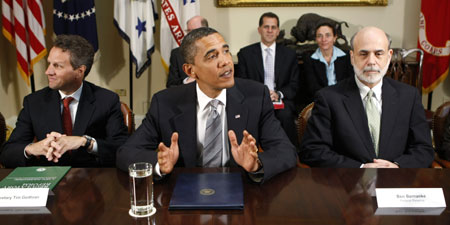U.S. President Barack Obama Wednesday unveiled new "rules of the road" for the nation's outdated financial system, the most significant regulatory transformation since the Great Depression in 1930s.
 |
|
U.S. President Barack Obama meets with regulators in the Roosevelt Room of the the White House in Washington June 17, 2009. |
Under the plan, the government will make the Fed a systemic risk regulator to oversee large institutions whose failure could threaten the stability of the entire system.
It also will create a council of regulators with broad coordination responsibility across the financial system. The council will discuss systemic risks but the Fed will not need its approval to act against them.
Hedge funds, derivatives and consumer mortgages, all blamed for the current crisis, will thus be under the supervision by the government.
And institutions that originate loans would be required to retain 5 percent of the credit risk when the loans are turned into securities.
"While this crisis had many causes, it is clear now that the government could have done more to prevent many of these problems from growing out of control and threatening the stability of our financial system," said the 85-page white paper released by the Obama administration.
In a speech at the White House, President Barack Obama said the current crisis is due to "a cascade of mistakes and missed opportunities" which took place over several decades.
"A culture of irresponsibility took root from Wall Street to Washington to Main Street. And a regulatory regime basically crafted in the wake of a 20th century economic crisis -- the Great Depression -- was overwhelmed by the speed, scope, and sophistication of a 21st century global economy," he said.
"We did not choose how this crisis began. But we do have a choice in the legacy this crisis leaves behind," said Obama. "So today, my administration is proposing a sweeping overhaul of the financial regulatory system, a transformation on a scale not seen since the reforms that followed the Great Depression."
"It's time for that to change. I am proposing that the Federal Reserve be granted new authority -- and accountability -- for regulating bank holding companies and other large firms that pose a risk to the entire economy in the event of failure," said Obama.
Treasury Secretary Timothy Geithner and Lawrence Summers, director of the White House's National Economic Council, said in an opinion piece published Monday in the Washington Post that the Fed would become a "systemic risk regulator" for "large, interconnected firms whose failure could threaten the stability of the system."
"All large, interconnected firms whose failure could threaten the stability of the system will be subject to consolidated supervision by the Federal Reserve, and we will establish a council of regulators with broader coordinating responsibility across the financial system," the two leaders wrote.
There will also be a new regulator to protect consumers and investors from risks in the financial world.
The new regulator, an independent Consumer Financial Protection Agency, would have the sweeping authority to impose fines and allow states to pass laws that are stricter than the federal standards.
Consumer protections are now spread among various state and federal authorities, including the Fed, the Securities and Exchange Commission, the Federal Trade Commission and banking regulators.
(Xinhua News Agency June 18, 2009)